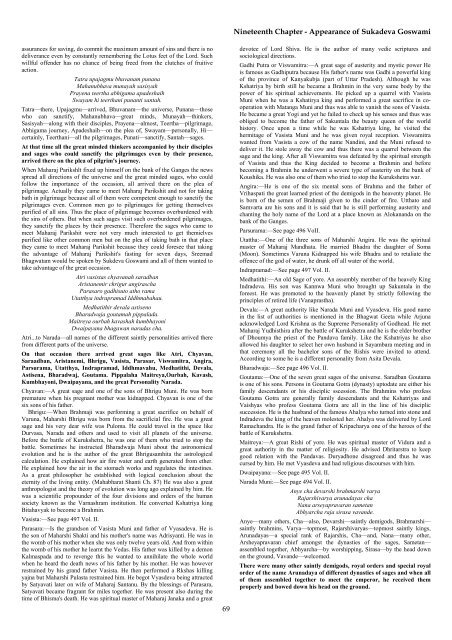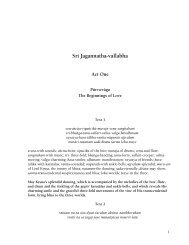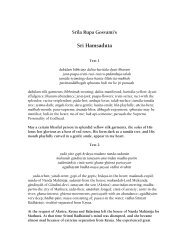Srimad Bhagavatam, Volume 3
Srimad Bhagavatam, Volume 3
Srimad Bhagavatam, Volume 3
You also want an ePaper? Increase the reach of your titles
YUMPU automatically turns print PDFs into web optimized ePapers that Google loves.
assurances for saving, do commit the maximum amount of sins and there is no<br />
deliverance even by constantly remembering the Lotus feet of the Lord. Such<br />
willful offender has no chance of being freed from the clutches of fruitive<br />
action.<br />
Tatra upajagmu bhuvanam punana<br />
Mahanubhava munayah sasisyah<br />
Prayena teertha abhigama apadeshaih<br />
Swayam hi teerthani punanti santah.<br />
Tatra—there, Upajagmu—arrived, Bhuvanam—the universe, Punana—those<br />
who can sanctify, Mahanubhava—great minds, Munayah—thinkers,<br />
Sasisyah—along with their disciples, Prayena—almost, Teertha—pilgrimage,<br />
Abhigama journey, Apadeshaih—on the plea of, Swayam—personally, Hi—<br />
certainly, Teerthani—all the pilgrimages, Punati—sanctify, Santah—sages.<br />
At that time all the great minded thinkers accompanied by their disciples<br />
and sages who could sanctify the pilgrimages even by their presence,<br />
arrived there on the plea of pilgrim's journey.<br />
When Maharaj Parikshlt fixed up himself on the bank of the Ganges the news<br />
spread all directions of the universe and the great minded sages, who could<br />
follow the importance of the occasion, all arrived there on the plea of<br />
pilgrimage. Actually they came to meet Maharaj Parikshit and not for taking<br />
bath in pilgrimage because all of them were competent enough to sanctify the<br />
pilgrimages even. Common men go to pilgrimages for getting themselves<br />
purified of all sins. Thus the place of pilgrimage becomes overburdened with<br />
the sins of others. But when such sages visit such overburdened pilgrimages,<br />
they sanctify the places by their presence. Therefore the sages who came to<br />
meet Maharaj Parikshit were not very much interested to get themielves<br />
purified like other common men but on the plea of taking bath in that place<br />
they came to meet Maharaj Parikshit because they could foresee that taking<br />
the advantage of Maharaj Parikshit's fasting for seven days, Sreemad<br />
Bhagwatam would be spoken by Sukdeva Goswami and all of them wanted to<br />
take advantage of the great occasion.<br />
Atri vasistas chyavanah saradban<br />
Aristanemir chrigur angirascha<br />
Parasaro gadhisuto atho rama<br />
Utatthya indrapramad Iddhmabahau.<br />
Medhatithir devala astiseno<br />
Bharadwaja goutamah pippalada.<br />
Maitreya ourbah kavashah kumbhayoni<br />
Dwaipayana bhagawan naradas cha.<br />
Atri...to Narada—all names of the different saintly personalities arrived there<br />
from different parts of the universe.<br />
On that occasion there arrived great sages like Atri, Chyavan,<br />
Saraadban, Aristanemi, Bhrigu, Vasista, Parasar, Viswamitra, Angira,<br />
Parsurama, Utatthya, Indrapramad, Iddhmavahu, Medhatithi, Devala,<br />
Astisena, Bharadwaj, Goutama. Pippalaha Maitreya,Ourbah, Kavash,<br />
Kumbhayoni, Dwaipayana, and the great Personality Narada.<br />
Chyavan:—A great sage and one of the sons of Bhrigu Muni. He was born<br />
premature when his pregnant mother was kidnapped. Chyavan is one of the<br />
six sons of his father.<br />
Bhrigu:—When Brahmaji was performing a great sacrifice on behalf of<br />
Varuna, Maharshi Bhrigu was born from the sacrificial fire. He was a great<br />
sage and his very dear wife was Puloma. He could travel in the space like<br />
Durvasa, Narada and others and used to visit all planets of the universe.<br />
Before the battle of Kurukshetra, he was one of them who tried to stop the<br />
battle. Sometimes he instructed Bharadwaja Muni about the astronomical<br />
evolution and he is the author of the great Bhrigusamhita the astrological<br />
calculation. He explained how air fire water and earth generated from ether.<br />
He explained how the air in the stomach works and regulates the intestines.<br />
As a great philosopher he established with logical conclusion about the<br />
eternity of the living entity. (Mahabharat Shanti Ch. 87) He was also a great<br />
anthropologist and the theory of evolution was long ago explained by him. He<br />
was a scientific propounder of the four divisions and orders of the human<br />
society known as the Varnashram institution. He converted Kshatriya king<br />
Bitahavyak to become a Brahmin.<br />
Vasista:—See page 497 Vol. II.<br />
Parasara:—Is the grandson of Vasista Muni and father of Vyasadeva. He is<br />
the son of Maharshi Shakti and his mother's name was Adrisyanti. He was in<br />
the womb of his mother when she was only twelve years old. And from within<br />
the womb of his mother he learnt the Vedas. His father was killed by a demon<br />
Kalmaspada and to revenge this he wanted to annihilate the whole world<br />
when he heard the death news of his father by his mother. He was however<br />
restrained by his grand father Vasista. He then performed a Rkshas killing<br />
yajna but Maharshi Pulasta restrained him. He begot Vyasdeva being attracted<br />
by Satyavati later on wife of Maharaj Santanu. By the blessings of Parasara,<br />
Satyavati became fragrant for miles together. He was present also during the<br />
time of Bhisma's death. He was spiritual master of Maharaj Janaka and a great<br />
69<br />
Nineteenth Chapter - Appearance of Sukadeva Goswami<br />
devotee of Lord Shiva. He is the author of many vedic scriptures and<br />
sociological directions.<br />
Gadhi Putra or Viswamitra:—A great sage of austerity and mystic power He<br />
is famous as Gadhiputra because His father's name was Gadhi a powerful king<br />
of the province of Kanyakubja (part of Uttar Pradesh). Although he was<br />
Kshatriya by birth still he became a Brahmin in the very same body by the<br />
power of his spiritual achievements. He picked up a quarrel with Vasista<br />
Muni when he was a Kshatirya king and performed a great sacrifice in cooperation<br />
with Matanga Muni and thus was able to vanish the sons of Vasista.<br />
He became a great Yogi and yet he failed to check up his senses and thus was<br />
obliged to become the father of Sakuntala the beauty queen of the world<br />
history. Once upon a time while he was Kshatriya king, he visited the<br />
hermitage of Vasista Muni and he was given royal reception. Viswamitra<br />
wanted from Vasista a cow of the name Nandini, and the Muni refused to<br />
deliver it. He stole away the cow and thus there was a quarrel between the<br />
sage and the king. After all Viswamitra was defeated by the spiritual strength<br />
of Vasista and thus the King decided to become a Brahmin and before<br />
becoming a Brahmin he underwent a severe type of austerity on the bank of<br />
Koushika. He was also one of them who tried to stop the Kurukshetra war.<br />
Angira:—He is one of the six mental sons of Brahma and the father of<br />
Vrihaspati the great learned priest of the demigods in the heaventy planet. He<br />
is born of the semen of Brahmaji given to the cinder of fire. Utthato and<br />
Samvarta are his sons and it is said that he is still performing austerity and<br />
chanting the holy name of the Lord at a place known as Alokananda on the<br />
bank of the Ganges.<br />
Parsurama:—See page 496 VoII.<br />
Utattha:—One of the three sons of Maharshi Angira. He was the spiritual<br />
master of Maharaj Mandhata. He married Bhadra the daughter of Soma<br />
(Moon). Sometimes Varuna Kidnapped his wife Bhadra and to retaliate the<br />
offence of the god of water, he drunk off all water of the world.<br />
Indrapramad:—See page 497 Vol. II.<br />
Medhatithi:—An old Sage of yore. An assembly member of the heavely King<br />
Indradeva. His son was Kannwa Muni who brought up Sakuntala in the<br />
foreest. He was promoted to the heavenly planet by strictly following the<br />
principles of retired life (Vanaprastha).<br />
Devala:—A great authority like Narada Muni and Vyasdeva. His good name<br />
in the list of authorities is mentioned in the Bhagwat Geeta while Arjuna<br />
acknowledged Lord Krishna as the Supreme Personality of Godhead. He met<br />
Maharaj Yudhisthira after the battle of Kurukshetra and he is the elder brother<br />
of Dhoumya the priest of the Pandava family. Like the Kshatriyas he also<br />
allowed his daughter to select her own husband in Sayambara meeting and in<br />
that ceremony all the bachelor sons of the Rishis were invited to attend.<br />
According to some he is a different personality from Asita Devala.<br />
Bharadwaja:—See page 496 Vol. II.<br />
Goutama:—One of the seven great sages of the universe. Saradban Goutama<br />
is one of his sons. Persons in Goutama Gotra (dynasty) uptodate are either his<br />
family descendants or his disciplic sscession. The Brahmins who profess<br />
Goutama Gotra are generally family descendants and the Kshatriyas and<br />
Vaishyas who profess Goutama Gotra are all in the line of his disciplic<br />
succession. He is the husband of the famous Ahalya who turned into stone and<br />
Indradeva the king of the heaven molested her. Ahalya was delivered by Lord<br />
Ramachandra. He is the grand father of Kripacharya one of the heroes of the<br />
battle of Kurukshetra.<br />
Maitreya:—A great Rishi of yore. He was spiritual master of Vidura and a<br />
great authority in the matter of religiosity. He advised Dhritarstra to keep<br />
good relation with the Pandavas. Duryadhone disagreed and thus he was<br />
cursed by him. He met Vyasdeva and had religious discourses with him.<br />
Dwaipayana:—See page 495 Vol. II.<br />
Narada Muni:—See page 494 Vol. II.<br />
Anye cha devarshi brahmarshi varya<br />
Rajarshivarya arunadayas cha<br />
Nana arseyapravaran sametan<br />
Abhyarcha raja sirasa vavande.<br />
Anye—many others, Cha—also, Devarshi—saintly demigods, Brahmarshi—<br />
saintly brahmins, Varya—topmost, Rajarshivaryas—topmost saintly kings,<br />
Arunadayas—a special rank of Rajarshis, Cha—and, Nana—many other,<br />
Arsheyapravaran chief amongst the dynasties of the sages, Sametan—<br />
assembled together, Abhyarcha—by worshipping, Sirasa—by the head down<br />
on the ground, Vavande—welcomed.<br />
There were many other saintly demigods, royal orders and special royal<br />
order of the name Arunadaya of different dynasties of sages and when all<br />
of them assembled together to meet the emperor, he received them<br />
properly and bowed down his head on the ground.












